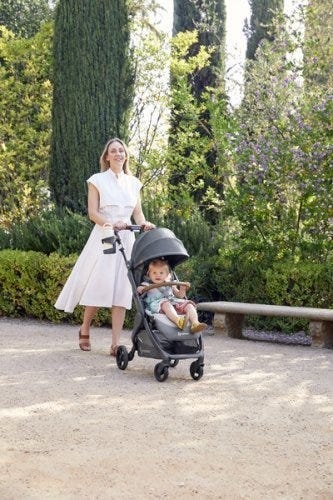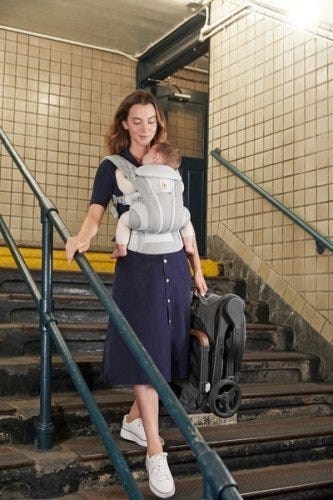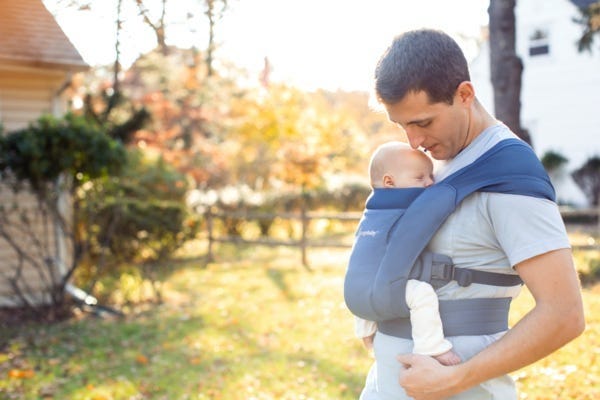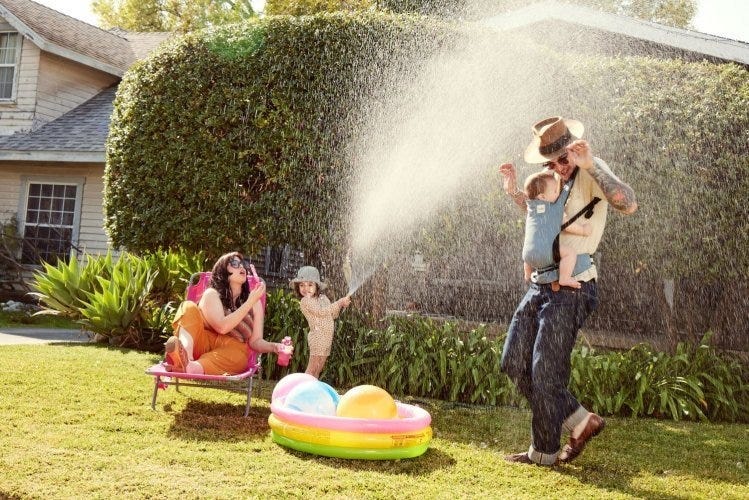Vimala McClure was a young woman in her early 20’s when she went to India and cared for babies in a large children’s home. Despite the very rustic living situation, and the limited amount of food for the babies, they seemed to thrive. She wondered why, until the evening she saw the older girls massaging the babies before putting them to bed. “The babies loved it,” Vimala said, “and they went right to sleep afterwards.” So when Vimala returned to the US, and had babies of her own, she chose to massage them, and in the process brought infant massage to the West. The massage Vimala designed, in those deep moments listening to her own babies, combined together the Indian infant massage techniques she had learned at the children’s home, with Swedish massage, reflexology and yoga. She collected information about babies’ amazing response to touch, and wrote her classic book, Infant Massage: A Handbook for Loving Parents. That book started a movement. The massage she developed, responding to her babies’ subtle cues as she stroked them, has spread around the world, bringing many parents and babies closer to each other. So why should you massage your baby?
- To feel closer to your baby, and understand her language.
- To help him sleep better (and you!).
- To help your prematurely born baby gain weight and maturity.
- To relieve constipation, reduce gas, and mature the digestive tract.
- And perhaps most of all to help you and your baby relax.
That is one of the major things that studies of infant massage show – a slight increase in stress during the massage itself, and afterwards a big reduction in stress hormones in your baby’s urine, and yours too. In fact, mothers who feel depressed or stressed in the early months of their parenting find that massage helps them enjoy being with their baby. Fathers who massage their babies have been shown to feel closer and have more affectionate interactions with their baby when they massage their babies regularly. Massage helps parents and babies bond with each other. One of the unique features of Vimala’s massage is taking a few minutes to ask permission of a baby before starting. Put a bit of oil on your hand (about the size of a quarter) and rub them together so that your baby can see and hear them. Open your hands and show your palms to your baby, looking into your baby’s eyes, if you can. Ask your baby if s/he would like a massage. “Do you want a massage?” Watch your baby’s response. Open body, eye contact, reaching for you, are all signs of openness to the experience. They say “yes.” Turning away, fussing, and restlessness are some signs that baby is saying “no.” In Infant Massage, A Handbook for Loving Parents, Vimala teaches the massage, step-by-step. She gives advice on setting up for the massage, and has sections for fathers, use of music, and massaging when your child is sick, amongst others. It is truly a classic that gives you all the information you need. If learning from a book is not optimal for you, consider classes from instructors who work with Infant Massage USA or other chapters of the International Association of Infant Massage (see IAIM.net). Infant Massage is a great way to help you and your baby have a great beginning, helping the two of you fall in love with each other and truly learn to communicate. And thrive.
Links: Touch Research Institute’s Tiffany Fields’ Book Titles List: Touch and Massage in Early Child Development Touch Therapy Massage Therapy Research Complementary and Alternative Therapies Research Infancy The Amazing Infant Children A to Z Heartbreak http://www6.miami.edu/touch-research/Books.html Newsletter “Touchpoints,” from The Touch Research Institute: http://www6.miami.edu/touch-research/Touchpoints.html Infant Massage USA http://www.infantmassageusa.org/?gclid=CM_bhaz54qQCFcu7KgodfGqqJw Nurturing Military Families, from Infant Massage USA: Excerpt: “He had just arrived home from the war the day before. Learning to massage his baby helped him get to know his baby in a special way and empowered him as a caregiver.” http://www.infantmassageusa.org/news/nurturing-military-families/ Touching: The Human Significance of the Skin A book by Ashley Montagu, excerpts: “The doctor tries to assist Nature with something it doesn't need assistance to do…The C-Section replaces the natural massaging passage of the newborn through its mother's womb with the artificial inducement of anesthesia, an incision of its mother, and the baby being lifted out directly from the womb by a surgeon into the cold world.” “…What the man, in his kindness and his goodwill did not understand was that the restricting cocoon and the struggle required for the butterfly to get through the tiny opening, were nature's way of forcing fluid from the body of the butterfly into its wings, so that it would be ready for flight once it achieved its freedom from the cocoon.”
There’s something magical about the summer sun, fresh air, and the great outdoors. As a mom, some of my fondest memories are of summertime adventures with my little ones. Whether it's a walk in the park or a hike through a lush forest, these moments are even more special when you have your baby close to you, sharing the experience. In this blog, I’ll explore the joys and benefits of using baby carriers during summer adventures, and how Ergobaby products can make your outdoor excursions even better.
The Benefits of Summer Adventures with Babies
Physical Benefits of Outdoor Adventures
Getting outside with your baby isn't just fun; it’s also incredibly beneficial for both of you. Fresh air and sunshine are great for everyone, but especially for babies and parents. Regular outdoor activities can help improve your baby's sleep patterns and boost their immune system.
For parents, it's a wonderful way to get some light exercise, which is essential for postpartum recovery and overall health.
Emotional Benefits of Getting Outside
Spending time in nature with your baby can strengthen the bond between you. The simple act of holding your baby close, feeling their warmth, and sharing new experiences together can create strong emotional connections. It’s also a wonderful way to reduce stress and improve your mood. When my littles were extra fussy, I’d take a walk around the neighborhood. Even though I don't live in an area with trails and surrounded by nature, simply behind outside changed everything. A little vitamin D does wonders!
Cognitive Development
Nature is a sensory wonderland for babies. The different sights, sounds, and smells can stimulate your baby’s senses and promote cognitive development. Watching leaves rustle, hearing birds chirp, and feeling the texture of a tree bark can all contribute to their learning and development.
All About Baby Carriers for Nature Adventures
Choosing the Right Baby Carrier
When it comes to selecting the best baby carrier for summer adventures, there are several options to consider.
Types of Baby Carriers:
- Wraps: Perfect for newborns, providing a snug and secure fit.
- Slings: Ideal for quick and easy use, offering good ventilation.
- Soft Structured Carriers: Versatile and comfortable for both parent and baby, suitable for longer trips.
Factors to Consider:
- Baby’s Age and Weight: Ensure the carrier is appropriate for your baby’s size and weight. For example, Ergobaby’s Embrace Newborn Carrier is perfect for the fourth trimester where baby is small and you’re looking for an easy way to stay close. As they grow, you’ll want to upgrade to an all-position carrier that’s meant for growing babies.
- Parent’s Comfort and Ergonomics: Look for carriers with padded shoulder straps and lumbar support if you’re planning on longer outings.
- Ease of Use: Choose a carrier that is easy to put on and take off.
- Climate and Breathability: Opt for carriers made of breathable fabrics to keep you and your baby cool in hot weather.
Safety Tips:
- Proper Positioning: Ensure your baby is seated correctly, with their legs in an "M" position and their head should be close enough to kiss.
- Checking for Wear and Tear: Regularly inspect your carrier for any signs of damage.
- Ensuring Adequate Support: Make sure the carrier provides proper support for your baby’s head and neck.
Exploring Nature with a Baby Carrier
Ideal Spots for a Nature Walk with Baby
- Parks and Gardens: Great for leisurely walks and picnics.
- Nature Trails and Forests: Perfect for more adventurous outings.
- Beaches and Lakesides: Wonderful for enjoying the water and sand, with the right carrier.
Activity Ideas
- Hiking: Enjoy a scenic hike with a hiking baby carrier that offers support and storage.
- Bird Watching: Use your carrier to keep your baby close while you explore and observe wildlife.
- Picnics: A carrier can free up your hands, making it easier to carry picnic supplies.


Advantages of Using Strollers for Nature Adventures


While baby carriers are fantastic for mobility and closeness, depending on the adventure of choice you might want to be a stroller along too.
There are a LOT of baby stroller options on the market. So we understand how confusing it can be to choose the one that’s right for your family. Not only are there a variety of brands, but a variety of strollers that serve different purposes.
There are a few types of strollers on the market:
- Full-sized stroller: This is typically the stroller parents thing of buying for all its versatility.
- Lightweight or umbrella stroller:These compact strollers are perfect for on-the-go adventures.
- Jogging stroller: Designed for parents who want to combine fitness with outdoor adventures.
- Double stroller: Designed for parents with multiple kids, especially twins.
- Car seat carrier: These strollers connect to a specific car seat. We don't typically recommend these as they can be unsafe for baby and uncomfortable for parents who are pushing.
Learn more about the types of strollers and which one would be best for you.
Benefits of Bringing a Stroller
- Storage Space for Gear: Ample room for carrying all your essentials like a diaper bag, beach toys and more.
- Shade and Weather Protection: Built-in canopies to shield your baby from the sun when they are lounging.
- Options: If you have more than one kid, you can stroll with one and carry the other. Or, if you’re getting warm or your little one is getting fussy, you can switch up their position from stroller to carrier or vice versa.
Safety Tips for Strollers
- Ensure your stroller is in good working condition. Make sure buckles are still buckling and that there are no rips or holes that could compromise your baby’s safety.
- Use sunshades or bug nets to protect your little one’s skin.
- Securing the baby properly: always buckle up your baby for safety even if you think they are old enough to go without the buckle.
Combining Baby Carriers and Strollers
For the ultimate flexibility, consider using both a baby carrier and a stroller on your outings.
Combining both options allows you to adapt to different situations. Use the carrier for more rugged trails and switch to the stroller for smoother paths or when your baby needs a nap.
Transition Tips
- Smooth Transitions: Plan stops where you can easily switch from carrier to stroller.
- Pack Light: Only bring essentials to make transitions easier.
Tips for a Successful Adventure
Planning Ahead
- Route Planning: Choose baby-friendly trails and parks. Check local mom groups or outdoor groups and get recommendations for the best outings for kids.
- Check Weather Conditions: Avoid extreme heat or unpredictable weather. Even with our most breathable carriers, when it’s hot, it’s hot. And having two bodies against each other in the heat will be naturally hot and sticky already.
- Packing Checklist: Include diapers, snacks, water, sunscreen, and a first-aid kit. These all-position carriers have storage pockets where you can fit some of the items easily!
- Stay Hydrated and Nourished: Pack healthy snacks to keep energy levels up and bring plenty of water for both you and baby.


Summer adventures with your baby are a wonderful way to create lasting memories and enjoy the beauty of nature together. From baby carriers to strollers, Ergobaby products are designed to provide comfort and ease for both you and your little one. So, gear up, get outside, and explore the world with your baby by your side.
Ready to embark on your own summer adventures? Check out Ergobaby’s range of baby carriers and strollers to find the perfect match for your family’s needs. Visit our website today and start planning your next outdoor excursion!



























